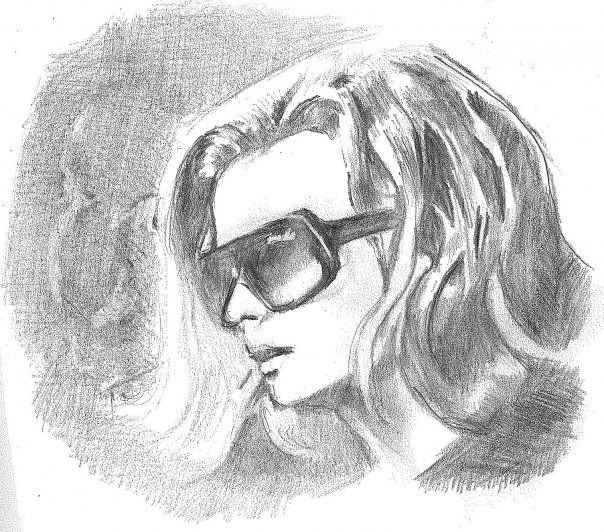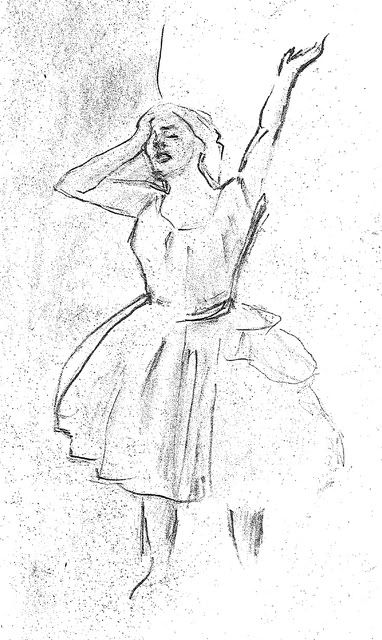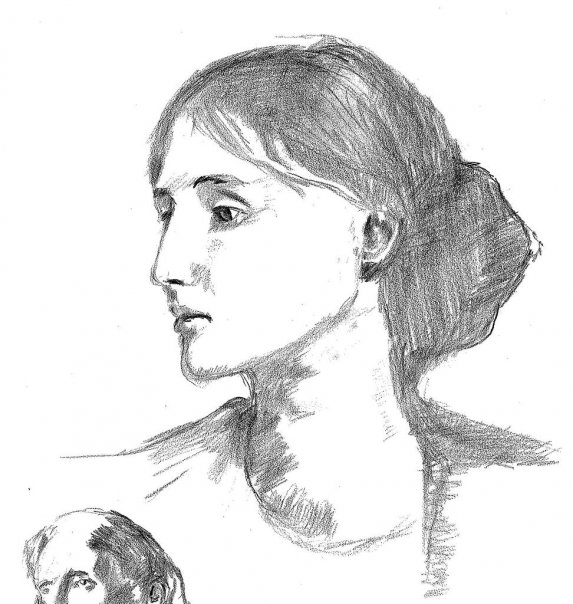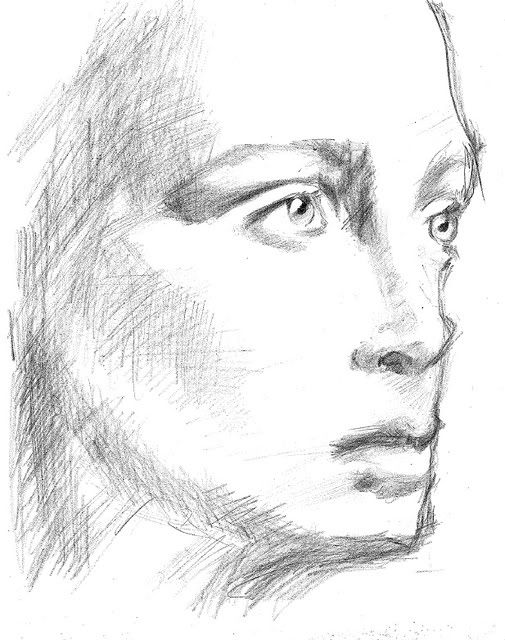
Sunday, January 31, 2010
The actress
"Je t'aime" is the first phrase we hear her say and for the rest of the movie she's restlessly wandering the streets of Paris, alone. Her face doesn't have any make up on and her lips curve down, fully, eternally forlorn. And after much silence in a few words she says what she fears the most: She won't age, because she'll go to sleep first. She disappears into the night, handsomely, like a boat. The image stays intact and 50 years later she hasn't aged, and the lonely trumpet that lulls her through a night in Paris reminds us of youth, in black and white and gray. In other circumstances, the actress has already died in the hands of tragedy. However, she never dies without having loved first, as if that satisfied the meaning of life, entirely. She quietly squirms and puts both fists near her chest because she knows she's a woman. She's bled, she's seen her hips grow and she's walked the streets at night in very high heels that have swollen her feet. And then after that, after she's smoked too many cigarettes and drank too many drinks, she wakes up in a different world, hangover, naked, and a letter rests beside her on her pillow. The handwriting of a man is impulsive, the letters are almost bolted onto the paper with violent strength and the ink splatters slightly from the stems of each "d" or each "y." In her thoughts, she talks without moving her lips and the coarse smoke laden voice reads the letter aloud in French. In it a fragment of a poem by Rilke, "From here there is no place that does not see you, you must change your life." Or I think that's what it said, the subtitles were white and overlapped on the pale close up of her face. She withdraws the letter and contemplates an empty landscape then she looks at me, in the dark, I look up and see the movement of the image travel through light from the film strip as it expands widely before me. Ladders of dust soar and cross through the the path of light with the sensuality of the smoke of a cigarette. The scene has changed in the meantime, and when I fix my eyes back on the screen, two hands are dipped in water, and off the water an image appears and becomes a photograph of herself in other times, when she was happy holding a man tightly. It ends, She ends.


Thursday, January 28, 2010
Study on a work by Degas by Cristhian Barron
Monday, January 25, 2010
Sunday, January 24, 2010
A woman's son
My relationship with the piano has been, at best, casual. I remember when I was a kid, taking the bus and going to take piano lessons, for which my mother paid. I was fulfilling a dream my mother had. I always notice how happy she is when I play, as if an old sentiment has suddenly brought the smell and taste of a day many years ago when she was a small girl and yearned to be a pianist. She sat down, then seven years old, and opened the lid of the black upright piano in the house she grew up on, and a white smile drew before her. She extended her arms and played the highest and lowest note, softly with the left hand, strongly with the right hand. And she put before her a sheet of music, that had in it notes that moved like a trail of ants on severe parallel lines. She then didn't know how to interpret what the notes were and why some were held together and some separated but she did know, because she had heard, that music was born from those symbols. Certainly she was by now (or then) convinced that a wonderful meditation would be wrought of the weaving of notes and that like this, the piano will forever appease her. But one day, shortly after she learned her first Mozart, a pain jolted from her wrists and punctured a nerve that would handicap the index and thumb of her right hand. Surgery was needed and years later a scar remains as a mark of a broken heart, and since life did not permit her to learn how to play the piano, I became my mother's hands. A magnificent melancholy fills her eyes. And i see her and I notice that time has scratched her face and has eroded her hands. And she smiles sweetly as I promise a Sonata by Mozart. She listens.

And as i play I think: It is lovely to be the son of this woman.

And as i play I think: It is lovely to be the son of this woman.
Saturday, January 23, 2010
Thursday, January 21, 2010
One wakes up
An enormous hand reaches from above and shuffles the colors of the day. And one wakes up to see the lamp post outside one's window and a black bird perched on a cable near it responding automatically to its instinct of being. The day outside is mauve and blue and the light smears onto the frame and one feels lucky because one has awoken comfortably. The tongue touches the palate; one stretches the legs and one feels unready to go outside. In a way, the enjoyment of a beautiful image so early in the morning is a pleasure that anyone with the ability to see has experienced. The absurdity of the very first thought is what amuses one the most; the first word one has thought and that most of the time does not return. Catching the first glimpse of the world in the morning, if one chooses to rest at night, is the most weighty part of one's existence. The shadows aren't sharp, the temperature is low, there is a more relaxed tame world that accepts him, because he hasn't been able to face anyone outside his bedroom. And if one leaps immediately, out of their bed and interrupts this suave method of waking up, one may disrupt in one instant the celestial labor of arranging the world for viewing. He adjusts one's lenses; the world loses its vehemence and his convictions become insecurities. Well, one would hate to be a pessimist and remain the whole day crestfallen, because after all things lose meaning until one is back to his dreams and he wakes up and the possibility is out there. The possibility of love? one fails if that is what one seeks, because the chances for disappointment are greater if love is what one must find. So here one is, in all his individuality trying to plan a way to get there, with or without the hand of God and his beautiful morning paint strokes; and one must find a reason to create something sincerely. After all, one IS God's paintbrush; one paints the sky and smears it with light.
Wednesday, January 20, 2010
Must I write?
Nothing fills you with the desire to write more than when you have freshly finished a book. Especially if said book has jabbed new ideas, new creations, new words inside you. Then a question is asked within yourself. Must I write? I instantly get intimidated and step on each word with trepidation. After all, English is my second language and in daily life I find it difficult to compose sentences that express a full idea. I seldom mumble the words I say and lose assurance of my greater idea and the sense of my thoughts get steamed with uncertainty. But even then, even if the grammar fails, must I still write? Then i go back to what i've done or to what has happened to me during these years; everything streamlines to the present up until the last word of the book I've just read. Then the certainty strains weakly through my fingers; it regrets some words and it replaces it with others. As I write I notice the abundance of the word "and" and instantly i revise its use and see if that is a fault of mine or simply that's the way my life has developed: a constant addition and compliment of one event to the other. Now see, nothing has happened yet; A story hasn't been formed nor a clear idea of the meaning of things has been expressed. Yet. There hasn't been a metaphor explaining how I see things but plainly I 've described my feelings as they are; they don't seem to look or to resemble anything else at the moment. However, if I make an slight effort I could say that finishing the book I've just read deserves a metaphor. It is, then, like the first time a butterfly has opened its wings and has discovered it is no longer a caterpillar and that it must fly. Yes, i also think that butterflies and wings are considered hackneyed picturesque objects of which a metaphor can be simply constructed, but I am not an expert and little by little bigger, more sophisticated comparisons will sprout. I feel that the ephemeral beauty of a butterfly it's more enjoyable than the long journey in life of the sluggish caterpillar. Life happens in slow motion and the years I've lived has shown me that I have memories that haven't moved; that are left in complete inertia. Regardless of the language I speak at the moment I will say something to dust off the time of the memories I have and if it sounds wrong and if my metaphors don't bear truth, I will then go back and correct them.
Subscribe to:
Comments (Atom)



